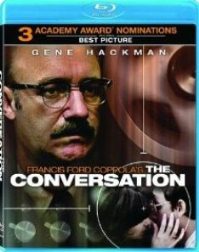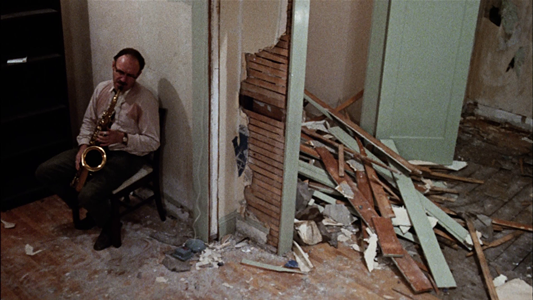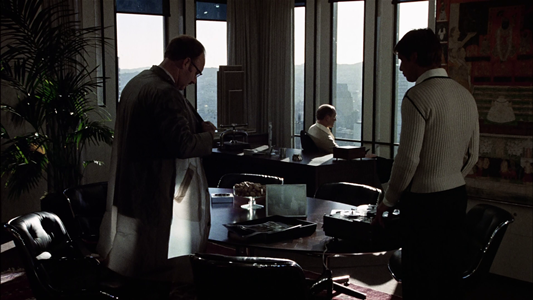BUY FROM AMAZON: CLICK HERE
STUDIO: Lionsgate
MSRP: $24.99
RATED: PG
RUNNING TIME: 113 minutes
SPECIAL FEATURES:
• Audio Commentaries
• Screen Tests
• Interviews
• Featurettes
The Pitch
Gene Hackman is watching you…
The Humans
Gene Hackman, John Cazale, Harrison Ford
The Nutshell
Spying on people? Not cool, man.
The Lowdown
In the 1970s there was no other filmmaker as untouchable as Francis Ford Coppola. He wrote Patton (winning an Academy Award); produced American Graffiti (nomination); wrote and directed The Godfather (two nominations, one win); wrote, produced, and directed The Godfather Part II (three wins); and wrote, produced, and directed Apocalypse Now (three nominations). A handful of films that most directors would kill to have in their entire career was accomplished by Coppola within a single decade. With such an essential output in such a short timespan it’s not hard to imagine another film slipping through the cracks. Much like Oliver Stone’s Platoon overshadowed his other equally brilliant 1986 effort Salvador, Coppola’s The Conversation (awarding him two nominations he would lose to himself) got lost in the wake of The Godfather Part II, but the new blu-ray from Lionsgate aims to bring new attention to a forgotten classic.

Harry knew he had a problem when he finished before even dialing the last number for his favorite phone sex hotline.
Gene Hackman portrays Harry Caul, a surveillance expert tasked with recording a conversation between a man and a woman in San Francisco’s Union Square. Little information is gleaned from the conversation, but as a strict professional Harry is there to record then get out, no questions asked, which is exactly how he prefers it. However, when Harry goes to deliver the tapes to the man who hired him he is confronted by someone else who won’t take no for an answer, thus setting the main events of the film in motion.
What sets The Conversation apart from other surveillance thrillers (like Enemy of the State, which clearly owes a debt to The Conversation even had Hackman not been in it) is that Coppola is less concerned about what is on the tapes than in Harry knowing that his complicity in the recording could potentially destroy people’s lives. This would be more fulfilling had the implications of the recordings not been a letdown. It’s a little hard to fear for Harry when the stakes turn out to be fairly anti-climactic. As the titular conversation is merely a McGuffin to get inside Caul’s head it is easy to dismiss, and thankfully Caul himself is an interesting character. He lives alone, plays the saxophone, occasionally visits a woman for sex, and bristles at the use of God’s name in vain. Even when he’s not saying anything (which is a good portion of the film) you’re still inexorably drawn to him.

A surprise to know one, "I Tore Up My Apartment in a Paranoiac Frenzy Searching for a Bug that May or May Not be There Blues" did not become a hit.
A character by himself can only be captivating for so long, so Coppola integrates Caul with fellow buggers (at a convention, no less) in what turns out to be the most interesting portion of the entire movie. The world of surveillance is put on full display bringing a new level of intrigue, and it’s astonishing to see all the antiquated equipment experts used nearly four decades earlier to accomplish what could be done with gadgets bought at Radio Shack today. Even better is the overt competition among the experts. Allen Garfield brings the perfect amount of sleaze, bitterness, and even reverence as Caul’s main rival. I found myself wishing the movie would stay with them and show them competing to see who could best the other in various surveillance challenges.
And therein lies the main of the film: it can’t decide what it wants to be. Between the paranoia thriller concerning the tapes, Harry’s moral dilemma about his chosen profession, and the insider look at the world of surveillance it’s hard to get caught up in one aspect without another one distracting you. As such, the whole of The Conversation unfortunately isn’t greater than the sum of its parts. The cast is uniformly great and the filmmaking is assured, but the storytelling lacks the necessary focus to truly suck the viewer in. This is a shame as the final twenty minutes are genuinely suspenseful and even had a shocking moment that scared me more than just about anything I’ve seen in the past decade. There are flashes of brilliance in The Conversation, I just wish it didn’t require so much patience to get there.

Lex Luthor, THX, and Han Solo in the same movie. That 'whoosh' you heard was the sound of nerds reaching for the Kleenex box.
The Package
Lionsgate’s 2011 blu-ray retains all the extras from the 2000 Paramount DVD, so feel free to gift that to a friend in need of a cinematic history lesson. I found myself losing interest in Coppola’s commentary; he does relay a lot of interesting production info but often relies too heavily on simply narrating what’s on screen. We also get a second commentary featuring legendary editor Walter Murch (how many editors get their own solo commentary?) plus screen tests, interviews, featurettes, and the film’s trailer. Simply put, this is stacked.
The audio and video are a touch spotty, ranging anywhere from pretty good to just okay, though David Shire’s piano-driven score sounds like it was recorded yesterday. Either way, the blu-ray is still a marked improvement from the previous DVD, for which Lionsgate deserves nothing but praise. For a film that seems to have been neglected over the years it’s nice to see such a lavish treatment, especially in regards to the extras. I don’t think The Conversation will ever look or sound better, and I mean that as a compliment.
Rating: 




Out of a Possible 5 Stars
